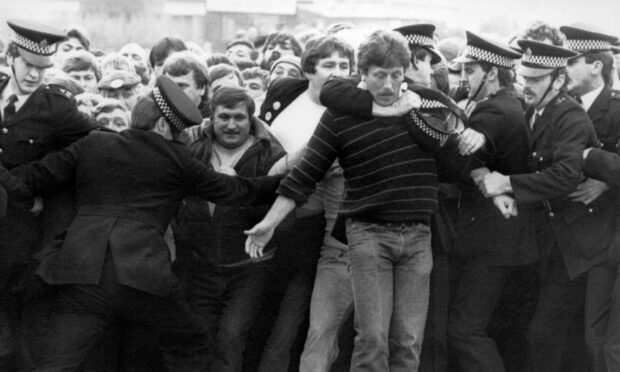Former Fife miners say an official pardon for convictions during the tough 1980s strikes has been “a long time coming”.
The new “landmark” change to the law aims to pardon miners convicted of certain crimes during the miners’ strike of 1984-1985, such as breach of the peace.
It comes after an independent review, led by human rights lawyer John Scott QC, was held into the impact of policing on mining communities during the strike.
Following the review, the government made a public commitment in 2020 to introduce legislation to pardon miners, including those who have since died.
Feelings remain on the wrongs of the 1980s
The publication of the legislation on Thursday was welcomed by ex-miners across the country – even if it was considered “too little, too late”.
It is estimated around 1,400 miners were arrested and 500 convicted during the 1980s.
This hit particularly hard in Fife which had the largest coalfield in Scotland.
This is a good thing but it is too little too late for a lot of people.
Hundreds of men were arrested, convicted, sacked and often blacklisted because of their involvement in the strike in the Kingdom.
President of the National Union of Mineworkers Nicky Wilson, who worked at Cardowan Colliery and later at Longannet Power Station, said it is welcome news for the wrongs of the 1980s.
Mr Wilson, 70, said: “We welcome this. It has been a long time coming and we still feel strongly about the misuse of police force during the strike and the mass arrests that happened in Scotland.”
He added: “Miners were given convictions that are on their records for things that would not normally happen.
“Many men actually pled guilty because if they pled not guilty the judiciary gave them bail and banned them from taking part in any further action.
“So they pled guilty to allow them to continue to be activists.
‘Still wrong today’
“It was wrong at the time and it is still wrong today.
“These individuals are law-abiding people who were involved in a dispute to fight for their jobs and were given criminal convictions despite never being in trouble before or after.”
Pat Egan, 61, who worked at Frances Colliery, added: “I welcome this because history shows miners as breaking the law which was never really the case.
“This is a good thing but it is too little too late for a lot of people.
“But it is good to know people are willing to listen to us, and that’s all we ever asked for.
“I want to thank all the people involved in the review as they were genuine people who wanted to listen to us.”
Justice secretary says this will heal wounds
Justice Secretary Keith Brown said he hopes the new change – made official through the The Miners’ Strike (Pardons) (Scotland) Bill – will go some way to healing the wounds of the past in places like Fife.
He said: “The miners’ strike was one of the most bitter and divisive industrial disputes in living memory.”
Delighted this morning to launch the Miners Strike Pardons Bill, at the Polmaise Mining Museum, with the President of the NUM, Nicky Wilson and Cllr Alasdair MacPherson. pic.twitter.com/eWQUfxPOFt
— Keith Brown (@KeithBrownSNP) October 28, 2021
He added: “This new draft legislation will go some way to aid reconciliation – and to help heal wounds within Scotland’s mining communities.
“A collective pardon will restore dignity to those convicted, provide comfort to their families and, I hope, will bring closure to the sense of injustice members of mining communities may feel.
“I am determined to make swift progress on this matter, given the passage of time since 1984-85, which is why we have acted quickly to bring forward and publish this landmark new bill.”

